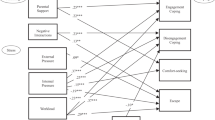Abstract
This study tested a possible explanatory framework of the coping and adaptation of 159 academically able seventh graders by exploring their strengths and vulnerabilities in coping with their differences, their peer relationship styles, and their patterns of achievement motivation. All of the youth in this sample scored in the 97th percentile on grade-level standardized tests with one fourth scoring at the mean of college-bound seniors on the SAT, an above-grade-level test for this age group. The range of responses included a bifurcated distribution pattern of strengths and vulnerabilities in values related to achievement motivation and normal distribution patterns in coping with self and academic ability and peer relationship style. The findings support use of structured self-reports in obtaining academically able youths' perspectives on self-in-context and as a supplement in psychosocial assessment.
Similar content being viewed by others
References
Altman, R. (1983). Socio-emotional development of gifted children and adolescents.Roeper Review, 6: 2 (Nov.), 65–69.
Douthitt, V. (1992). A comparison of adaptive hehavior in gifted and non-gifted children.Roeper Review, 14: 3 (March), 149–150.
Franks, B. & Dolan, L. (1982). Affective characteristics of gifted children: Educational implications.Gifted Children Quarterly, 26, 172–178.
Olszewski-Kubelius, P. & Kulieke, M. (1989). Personality dimensions of gifted adolescents. In Olszewski-Kubelius, P. & Kulieke, M.Patterns of influence on gifted learners: The home, the self, and the school, New York, Teachers College Press. pp. 125–145.
rice, J. (1985).The gifted: Developing total talent (2nd ed.). Springfield, IL: C.C. Thomas.
Terman, L. (1925). Mental and physical traits of a thousand gifted children,Genetic studies of genius, vol. I, Standford, CA.: Stanford University Press.
Tolan, S., (1989). Special problems of young highly gifted children.Understanding Our Gifted, 1: 5, 7–10.
Timberlake, E. (1990). Coping and adaptation by children with mild physical differences.Child and Adolescent Social Work Journal, 7: 3, 199–216.
Wong, M. & Csikszentmihalyi, M. (1991). Motivation and academic achievement: The effects of personality traits and the quality of experience.Jouranl of Personality, 59: 3, 539–574.
Author information
Authors and Affiliations
Rights and permissions
About this article
Cite this article
Timberlake, E.M., Barnett, L.B. & Plionis, E.M. Coping with self and academic talent. Child Adolesc Soc Work J 10, 21–37 (1993). https://doi.org/10.1007/BF00758021
Issue Date:
DOI: https://doi.org/10.1007/BF00758021




